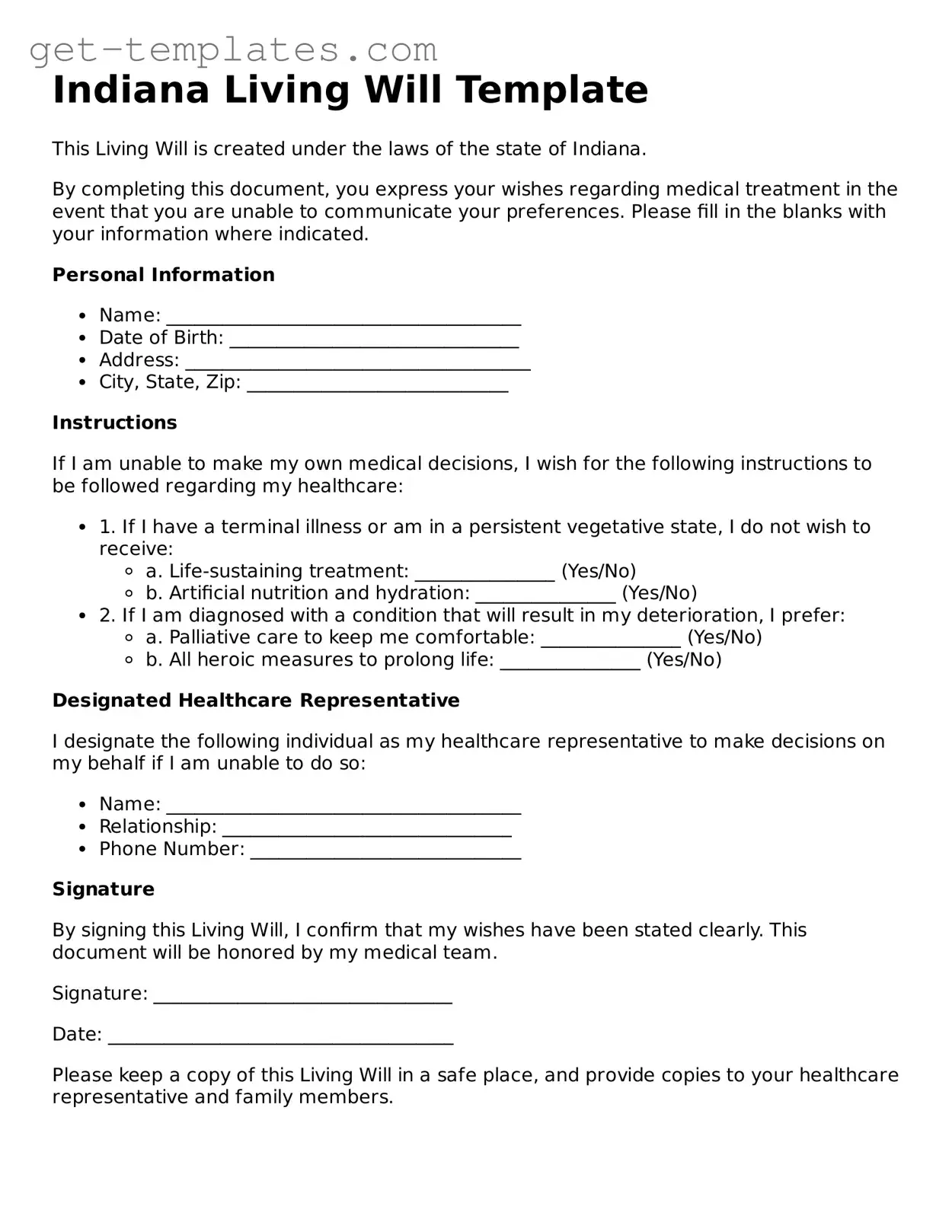What is a Living Will in Indiana?
A Living Will is a legal document that allows individuals to outline their preferences for medical treatment in the event that they become unable to communicate their wishes. In Indiana, this document specifically addresses end-of-life care and can guide healthcare providers and family members in making decisions that align with the individual's values and desires.
Who can create a Living Will in Indiana?
Any competent adult who is at least 18 years old can create a Living Will in Indiana. It is important that the individual understands the nature and consequences of the document they are signing. This ensures that their wishes are clearly articulated and legally binding.
What should be included in a Living Will?
A Living Will typically includes:
-
Your personal information, including name and address.
-
A clear statement of your wishes regarding medical treatment.
-
Specific instructions about life-sustaining treatments, such as resuscitation, mechanical ventilation, and feeding tubes.
-
Your signature and the date of signing.
Additionally, it may be beneficial to discuss your wishes with family members and healthcare providers to ensure everyone understands your preferences.
How do I create a Living Will in Indiana?
To create a Living Will in Indiana, you can either use a standardized form provided by the state or draft your own document. Here are the steps to follow:
-
Obtain a Living Will form, which can often be found online or through healthcare providers.
-
Fill out the form with your personal information and treatment preferences.
-
Sign the document in the presence of two witnesses or a notary public to ensure its validity.
After completing the form, keep it in a safe place and share copies with your healthcare provider and family members.
Do I need witnesses for my Living Will?
Yes, in Indiana, your Living Will must be signed in the presence of two witnesses or a notary public. The witnesses cannot be your spouse or a blood relative, and they should not be individuals who will benefit financially from your death. This requirement helps to ensure the authenticity of your document.
Can I change or revoke my Living Will?
Absolutely. You have the right to change or revoke your Living Will at any time, as long as you are still competent to make decisions. To revoke the document, you can simply destroy it or create a new Living Will that explicitly states your current wishes. It is advisable to inform your healthcare providers and family members of any changes you make.
What happens if I do not have a Living Will?
If you do not have a Living Will, medical decisions may be made by your family members or healthcare providers based on what they believe is in your best interest. However, without clear guidance, this can lead to confusion and disagreements among loved ones. Having a Living Will helps ensure that your wishes are respected and can alleviate stress for your family during difficult times.
Is a Living Will the same as a Power of Attorney?
No, a Living Will and a Power of Attorney are different documents. A Living Will specifically addresses your preferences for medical treatment, while a Power of Attorney allows you to designate someone to make financial or healthcare decisions on your behalf if you become incapacitated. It is often advisable to have both documents in place to ensure comprehensive planning for your future.
Where should I keep my Living Will?
Store your Living Will in a safe yet accessible location. Consider keeping a copy in your medical records at your healthcare provider's office. Additionally, inform your family members and the person you designate as your Power of Attorney about its location. This way, they can easily find it when needed.
What if I move to another state?
If you move to another state, your Indiana Living Will may still be valid, but it is wise to review the laws in your new state. Different states have varying requirements for Living Wills, and you may want to consider creating a new document that complies with the laws of your new residence. Always consult with a legal expert if you have questions about the validity of your documents after relocating.

